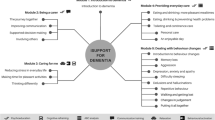Abstract
Few consumer health websites target low-literate and/or non-English speaking patient populations, despite the fact that these populations are most vulnerable to poor health outcomes. Latinos providing care to a family member with Alzheimer’s disease and related dementias (ADRD) fall within this vulnerable population in that they face numerous language, literacy, and cultural barriers to accessing and using health and social services. As a result, Latino family caregivers tend to suffer greater morbidity due to stress burden than ADRD caregivers in Anglo American, English-speaking families. Moreover, distance and other convenience barriers prevent family caregivers across ethnic groups from utilizing health and support services. The internet represents a promising tool for eliminating barriers to education and service use among family caregivers. In particular, using the internet to reach Latino caregivers, who are most at-risk for stress-related morbidity, could represent a breakthrough means for reducing health disparities in this group. In this paper, we report our efforts to develop a “plain language” bilingual website to educate and support Latino family caregivers. We review our website design process, preliminary evaluation study findings, and future directions for web-based education for under-served Latino family caregivers.


Similar content being viewed by others
References
Alzheimer’s Association (2004). Growth of Alzheimer’s Disease through 2025. Alzheimer’s Association.
Czaja, S. J., & Rubert, M. P. (2002). Telecommunications technology as an aid to family caregivers of persons with dementia. Psychosomatic Medicine, 643, 469–476
Delgado, M. (ed.) (2000). Latino elders and the 21st century: Issues and challenges for culturally competent research and practice. Haworth: Binghamton, NY.
Hepburn, K. W., Tornatore, J., Center, B., & Ostwald, S. W. (2001). Dementia family caregiver training: affecting beliefs about caregiving and caregiver outcomes. Journal of the American Geriatric Society, 494, 450–457
Ho, C., Cui, X., Weitzman, P., & Levkoff, S. (1999). Stress and service use among minority caregivers to elders with dementia. Journal of Gerontological Social Work, 33, 67–88
Levkoff, S., & Sanchez, H. (2003). Lessons learned about minority recruitment and retention from the Centers on Minority Aging and Health Promotion. The Gerontologist, 43(1), 18–26
Lu, Y. F., Austrom, M. G., Perkins, S. M., Bakas, T., Farlow, M. R., He, F., Jin, S., & Gamst, A. (2007). Depressed mood in informal caregivers of individuals with mild cognitive impairment. American Journal of Alzheimers Disease and Other Demenentias, 224, 273–285
Monahan, D. J., Greene, V. L., & Coleman, P. D. (1992). Caregiver support groups: Factors affecting use of services. Social Work, 373, 254–260
National Institute on Aging (2007). One in seven Americans age 71 and older has some type of dementia. Available at www.nia.nih.gov/alzheimers/researchinformation/newsreleases/pr20071030adams.htm. Accessed on :1/25/08.
National Institute on Aging (2008). NH seeks volunteers to help with landmark Alzheimers study. Available at www.nia.nih.gov/alzheimers/researchinformation/clinicaltrials. Accessed on 1/25/08.
Norman, D. A. (1993). Things that make us smart—Defending human attributes in the age of the machine. Reading, MA: Addison-Wesley
Pearlin, L. I., Aneshensel, C. S., Mullan, J. T., & Whitlach, C. J. (1997). Caregiving and its social support. In R.H. Binstock, L.K. George (Eds/). Handbook of aging and the social sciences, 4th ed., (pp. 283–302). San Diego: Academic
Pederson, E. M. (1995). Storytelling and the Art of Teaching. Forum, 33, 2
Pew Research Center (2007). Latinos online. Available at www.pewhispanic.org/reports/report.php?reportid=73. Accessed 1/25/08
Valle, R. (1998). Caregiving across cultures: Working with dementing illness and ethnically diverse populations. Washington, DC: Taylor & Francis
Acknowledgement
This pilot project was conducted while Dr. Weitzman served as Research Scientist with Environment and Health Group Inc., Watertown, MA. It was funded by a grant from the National Institute on Aging, grant # 1R43AG20869-1. The authors would like to thank World Education Inc. for assistance with the design and implementation of the evaluation studies.
Author information
Authors and Affiliations
Corresponding author
Rights and permissions
About this article
Cite this article
Weitzman, P., Neal, L., Chen, H. et al. Designing a Culturally Attuned Bilingual Educational Website for US Latino Dementia Caregivers. Ageing Int. 32, 15–24 (2008). https://doi.org/10.1007/s12126-008-9000-9
Published:
Issue Date:
DOI: https://doi.org/10.1007/s12126-008-9000-9




